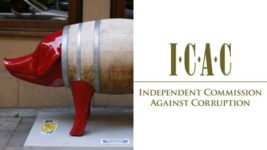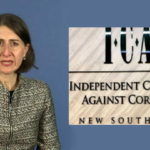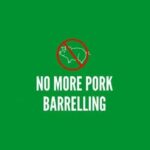Pork Barrelling Breaches the Rule of Law

Disinformation regarding the lawfulness of pork barrelling prevails at present, and this has been propagated by senior Coalition ministers, an ICAC forum has found.
Former PM Scott Morrison suggested last month that the practice of handing out public money to gain an electoral advantage doesn’t constitute breaking the law, while ex-NSW premier Gladys Berejiklian said in 2020, “it’s not an illegal practice”, and unfortunately, it does happen occasionally.
ICAC chief commissioner Peter Hall QC explained at a forum on pork barrelling held by the NSW corruption watchdog last Friday, that these assertions by senior ministers show a grave “lack of appreciation… as to the existence of the rule of law in this space in relation to grants funding”.
The commissioner outlined that concerns around the pork barrelling cases exposed over recent years by federal and state auditors general and a NSW parliamentary committee has necessitated the ICAC inquiry to determine whether the practice is lawful or whether it breaches the rule of law.
In this state, the rule of law comprises of four parts, Hall outlined, which include “the public trust issues that apply to public officeholding”, “the common law offence of misconduct in public office”, “the NSW Ministerial Code”, as well as “the jurisdiction and statutory functions” of the ICAC.
Minsters should “learn quick smart”
The forum was held following the release of a report by Sydney University constitutional law expert Professor Anne Twomey, in which she recommends that statutory rules be applied to grants schemes, along with the establishment of criminal offences and penalties.
Twomey told the forum that “like many” she’s been “infuriated by ministers… asserting that they have unfettered ministerial power and that there is nothing illegal about pork barrelling”, as, in her opinion, both these propositions are wrong.
The professor points out that administrative law restricts ministerial power, so decisions aren’t made “for improper purposes”, federal statutory limits require expenditure isn’t “unethical”, criminal offences, like bribery, may apply, as well as misconduct in public office at common law.
“Governments have a legal and constitutional duty to act in the public interest,” Twomey continues. “The High Court has said that it’s a fundamental obligation of members of parliament, including ministers, to act in the public interest, and to serve the people with fidelity.”
According to Twomey, this duty to the public is breached when ministers aren’t acting in its interest but rather their own or those of supporters or lobbyists, and this can amount to misconduct in public office and warrant criminal punishment.
The professor adds that acts such as pork barrelling that are said to serve the party interest, can, ultimately, be found to be in the personal interests of a minister when factors such as differences in pay grades are taken into account.
Questions of corruption
The Morrison government was caught handing out grants in a preferential manner in relation to sporting projects and carparks, while premier Berejiklian’s downfall came when the ICAC announced an inquiry into grants she’d greenlighted for a Wagga Wagga gun club and a music school.
The NSW Independent Commission Against Corruption’s forum also involved Ethics Centre director Dr Simon Longstaff, NSW deputy auditor general Ian Goodwin and Centre for Governance and Public Policy public integrity and anti-corruption research program leader Professor AJ Brown.
ICAC commissioner Hall further explained that following the forum the anticorruption body will produce a report outlining its views on the practice of pork barrelling, and whether it constitutes corruption.







